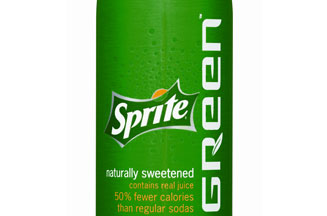
Coca-Cola's planned launch of Sprite Green is the opening salvo in what looks to be the latest battle in the UK soft-drinks market: that of natural sweeteners.
Sprite Green, which is already available in the US, will be the first soft drink in the UK to use the natural sugar substitute Truvia. Truvia, derived from the South American stevia plant, is believed to be 300 times sweeter than sugar. It is also lower in calories and contains no artificial ingredients.
Pepsi was first to show its hand with last year's launch of its own stevia-derived natural sweetener, PureVia, produced in collaboration with US company Whole Earth Sweetener.
The arrival of stevia-based sweeteners is expected to usher in a new category in the soft-drinks market, in which, perhaps inevitably, Coca-Cola and Pepsi will be the major players. It will have wider implications, too, with industry experts predicting that it will have a pro-found effect on the marketing of low-calorie brands as a whole.
Although there are already several very low-calorie artificial sweeteners on the market, such as Sucralose, their production often involves the use of bulk chemicals for extraction purposes, making them less attractive to consumers.
'Stevia has a significant edge because it sounds very natural,' says David Goudge, managing director at innovation company Brand Development.
He believes the product has health benefits, too, that could play a big part in the push to tackle rising obesity levels.
'If it's as good and clean as is claimed, it's got to be a good thing, especially with sugar being used so extensively to hide bad tastes in low-fat foods,' adds Goudge. 'This will enable the development of lower-fat foods with a decent, longer-lasting sweetener, allowing some really nice anti-obesity propositions.'
Gareth Helm, a former marketer at Innocent and now director at online research firm and brand development consultancy Brand Chat, agrees that the health claims are a major draw for consumers.
However, he sounds a warning. 'Although it's a clever way of reducing sugar content, I am cautious of these things. Consumers want something that hasn't been messed around with. If it's too techno, or too good to be true, it will be questioned.'
Helm's words are borne out by the marketing of diet drinks in recent years, which has avoided a focus on artificial sweeteners, such as aspartame, which have a poor public image.
Such brands could fall foul of an emphasis on the natural element of other products. According to Jon Platt, partner at innovation house ?What If!, brands that make prominent health claims are likely to make consumers reassess the value of their other brands.
He believes that Coca-Cola will use Sprite Green as what he describes as a 'stalking horse'. 'If it fails, then it hasn't damaged its biggest brand. If it succeeds, a valuable lesson will have been learned, and it may be that these new sweeteners find their way into the colas,' he explains.
Uncertain future
Coca-Cola has said that the Sprite Green extension is likely to be the first of many low- and zero-calorie beverages it will launch containing Truvia.
However, uncertainty remains about the use and marketing of stevia-derived goods within Europe.
Brand consultant and former Britvic marketing chief Andrew Marsden questions whether ads using the term 'natural' will be allowed under EU regulations. 'If it's a straightforward extract, they might be able to [use the word],' he adds.
Helm, on the other hand, argues that when the hype surrounding claims dies down, consumers will begin to dig deeper into the origins of the product. 'When people use science and play with food, there has to be a very clean and simple story,' he says.
As belt sizes widen around the world, low-calorie natural sweeteners are bound to grow in importance. PepsiCo and Coca-Cola have declared their intent; the consumer reaction, mean-while, will act as a benchmark for others.

